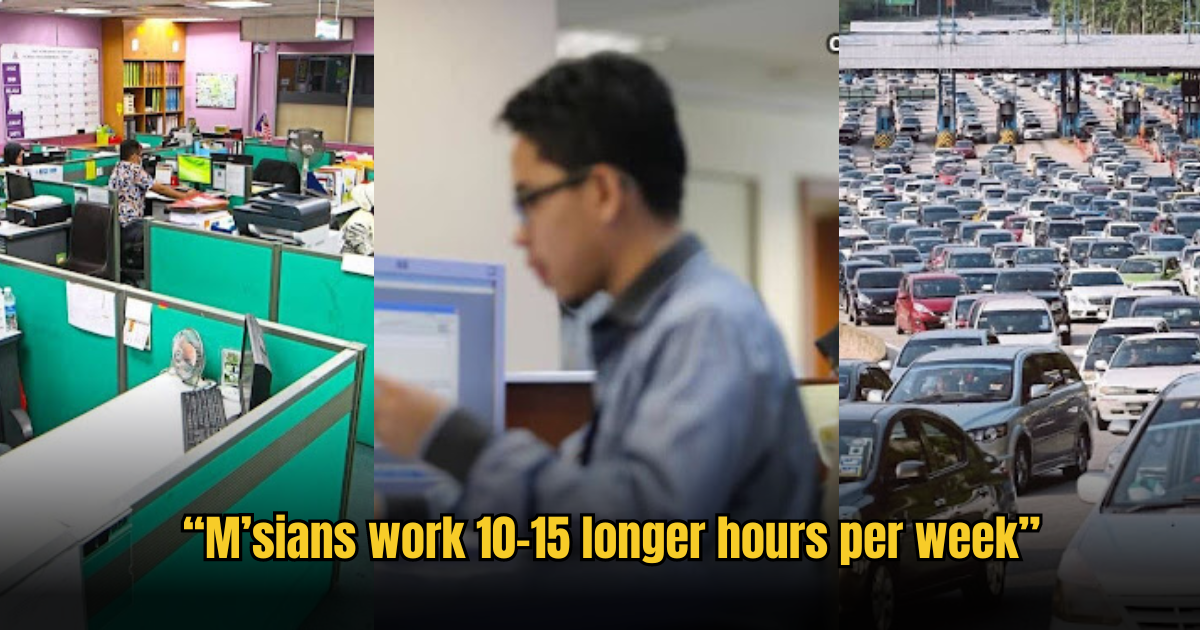Disclaimer: In Real Life is a platform for everyday people to share their experiences and voices. All articles are personal stories and do not necessarily echo In Real Life’s sentiments.

In recent viral news, Malaysia has been ranked the second-worst country in the world when it comes to work-life balance.
The global study, conducted by HR company Remote, included 60 countries, and Malaysia was ranked 59th, above Nigeria at 60th. Top three on the list were New Zealand (1st), Spain (2nd), and France (3rd).
Interestingly, our closest neighbour Singapore was ranked 19th. It comes as a surprise that Singapore, known for its kiasu (workaholic) culture, was ranked above Malaysia!
If you’re curious, you can take a look at the full study here.
So, why is Malaysia’s work-life balance so terrible? Well, here are the top 5 reasons why. Let’s take a look:
1. Malaysians don’t get enough annual leave
According to the Employment Act 1955, Malaysian workers get 8 days of annual leave with 1 – 2 years of employment with a specific employer. However, those who work in the service industry may find themselves working up to 6 days a week, especially those in F&B or Hospitality.
In comparison, New Zealand has 32 annual leave days, and Singapore has 18. For the curious, the country with the most generous annual leave policy is Iran with 53 days! (However, it is also ranked pretty low in terms of overall work-life balance, sitting at 54th on the list.)
2. Malaysians have one of the worst commutes in the world
Kisi’s Work-Life Balance Report revealed that KL-ites were at the number 1 spot for the people who spent the most amount of time commuting and working. This obviously comes as no surprise to us, let’s be real.
Traffic congestion is a big problem in Malaysia, made especially worse by our lack of effective public transport infrastructure.
For example, an office worker would have to leave at 6.30 AM to reach their office in the centre of KL before the jam starts. If they are just 10 minutes late, they’d be caught in the jam on the LDP, Shah Alam expressway, Sungai Buloh highway, or Federal Highway.
3. Malaysia’s work hours are very long
The study noted that Malaysians worked an average of 40.8 hours of work per week, compared to New Zealand’s 26.3 hours and Singapore’s 29.1.
You would think that a 40 hour work-week is the norm, but it seems we are already lagging behind more developed countries, where the standard is now closer to 25-30 hours a week.
That’s because science has discovered that for the most productive work day, 6 hours is the sweet spot, after which you only get diminishing returns due to fatigue and lack of rest.
But Malaysian society has a very rigid idea of how much work is considered “enough”. For example, there is a culture of shame amongst Malaysians who go home early, and those who aren’t at their desks are viewed as not being productive.
Plus, according to our Employment Act, the Malaysian workweek is actually even longer at 48 hours! Should we revise this to 35 hours?
4. Malaysia is dependent on foreign labour
Malaysia’s rapid development is all thanks to our dependence on foreign labour. Much of our manual labour is done by workers who come from countries like Nepal and Bangladesh.
Because they are often underpaid and overworked, it drives the cost of labour down, making the average wage lower than other countries.
However, foreign workers not only live in terrible and cramped conditions, but they’re also often abused while on the job. The treatment of our foreign workers has gotten so bad that Indonesia has refused to send their people to us to work as maids.
5. Malaysian workers are underpaid
As a result, the average cost of labour in Malaysia is far below living standards in other countries. While some countries seek to reduce work hours and working days, Malaysian employers are reluctant to even raise the minimum wage.
A report released by Bank Negara back in 2018 stated that to live with an acceptable standard of living in KL, a single person would need to earn at least RM2,700.
Fast-forward to 2024, and this amount would only have increased by at least 30%. For comparison, what counts as poverty wages is now RM2,208.
The Malaysian minimum wage was raised from RM1,200 to RM1,500 back in May 2022. Although the change is welcomed by many Malaysians, it is still not enough.
Unsurprisingly, this does not help the issue of Malaysian employees being overworked. Many Malaysians are forced to take 2nd and 3rd jobs just to make ends meet, which reduces personal time with family and increases work hours from 40 to as high as 60 per week.
How bad is our work-life balance?
Share your thoughts in the comments!
Have a story to tell? Email us at ym.efillaerni@olleh and you may be featured on In Real Life Malaysia.
Also read: Faced With Stagnant RM1500 Minimum Wage, M’sian Fresh Grads Choosing Jobs in SG
Faced With A Stagnant RM1,500 Minimum Wage, Malaysia’s Fresh Grads Are Choosing Jobs in Singapore
You might also like
More from Viral News
“I Miss My Home,” Shares M’sian Cosplayer Who Lost Everything in Putra Heights Explosion
This story is about Elizabeth Mae Hendroff, a Malaysian content creator and cosplayer whose life was turned upside down by …
“The Windows Were Shaking” Victims of the Putra Heights Gas Fire Share Their Firsthand Experiences
Residents of Putra Heights recall their narrow escape from a 30-meter high inferno that erupted from a gas leak in …
“RM15 For Roti John? Even McD Cheaper Lah,” Shares M’sian Shocked By Ramadan Bazaar Prices
Every Ramadan, Malaysians look forward to the festive bazaars selling mouthwatering dishes, from ayam percik to murtabak. But this year, …


















